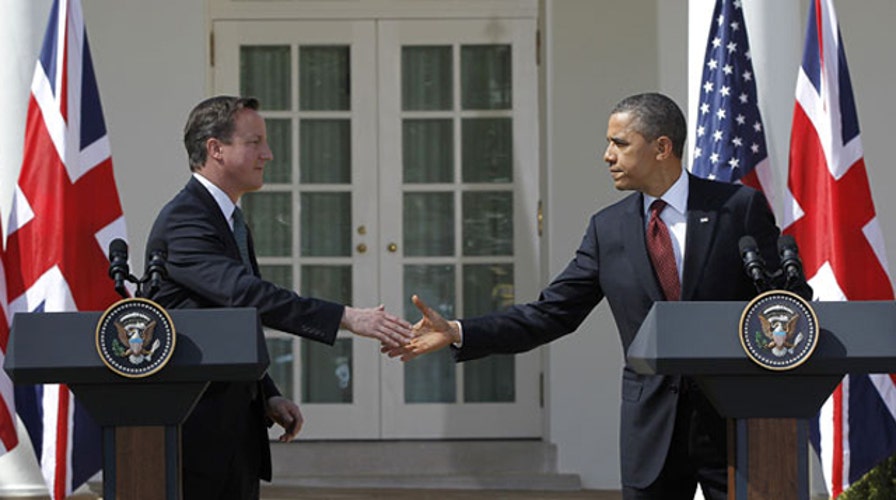WH behind missing 'radical Islam' in Obama-Cameron op-ed?
British Prime Minister David Cameron has taken tough stances on radical Islam, So, the absence of those key words in joint terror op-ed with Pres. Obama raised eyebrows
This is a rush transcript from "On the Record," January 15, 2015. This copy may not be in its final form and may be updated.
GRETA VAN SUSTEREN, FOX NEWS HOST: President Obama and British Prime Minister David Cameron writing a joint op-ed in the Times of London ahead of their meeting at the White House tonight, the two world leaders vowing to stand together to fight terrorism. Now, in the op-ed, the president and prime minister write in part. "Whether we are facing lone fanatics or terrorist organizations, such as Al-Qaeda, Islamic state or Boko Haram, we will not be cowed by extremist. We would defeat this barbaric killers and their distorted ideology."
Now, if you read the entire joint op-ed, there is no mention of radical Islam. Why not? Joining us, Nile Gardiner, director of the Margaret Thatcher Center for Freedom. Now, am I just picking away at this thing and I'm being unfair? Why is there no radical Islam or is that just irrelevant to the discussion?
NILE GARDINER, DIRECTOR MARGARET THATCHER CENTER FOR FREEDOM: Well, I think it's an extremely important point. Looking carefully at that op-ed in the Times of London today, clearly, both leaders do not refer to Islamic radicalism or Islam extremism. I suspect that is because the White House probably requested that because President Obama does not refer to these terror attacks that we have seen happening in Europe as Islamist related. Now, David Cameron is very different in this respect. He has on a number of occasions referred to the poisonous ideology of Islamist extremism. He is far more hard hitting in terms of the language he uses about identifying the nature of the Islamist threat that we face. So there is a clear distinction actually between the position of the British prime minister and the U.S. president.
VAN SUSTEREN: Except for the British prime minister, if that is indeed so, allowed the president of the United States to sort of scrub his op-ed and they put it in the London Times. I didn't see in The New York Times or The Washington Post. I mean why would the British prime minister who has been more hard hitting on that issue and the president, of course, won't say that -- why would he let -- why would he let that happen?
GARDINER: Well, I suspect that David Cameron doesn't want to have any kind of dispute when he comes here to Washington. But in tomorrow's press conference of the two world leaders, I think you are going to see a distinction coming across between the British prime minister and the U.S. President. But I do think that Barack Obama at the moment looks very, very weak with regard to the global fight against Islamic extremism. He doesn't even refer to this as a war. I do think that David Cameron understands we are engaged in a global war against the Islamist, a war that we absolutely have to win. So there is a clear divide between the two leaders on this. It will be very interesting to see if this position actually comes out tomorrow. And you have seen a number of David Cameron's cabinet ministers coming out referring to the fight against Islamist radicalism. And so you do have a more clear cut sense in Britain than do you have here in Washington with regard to President Obama's handling of this issue.
VAN SUSTEREN: We only have 30 seconds left. If there is a way to sort of distill what the British reaction was to President Obama not showing up in Paris, no big deal or did they see that as a slight?
GARDINER: I do think they saw as it a very big deal, actually. Obama's no show in Europe, frankly, was a huge slap in the face for America's allies in Europe. It was arrogant. It was rude. It was very dismissive. It sent all the wrong signals to America's friends in Europe and all the wrong signals to America's enemies on the world stage.
VAN SUSTEREN: Niles, thank you.
GARDINER: My pleasure.

